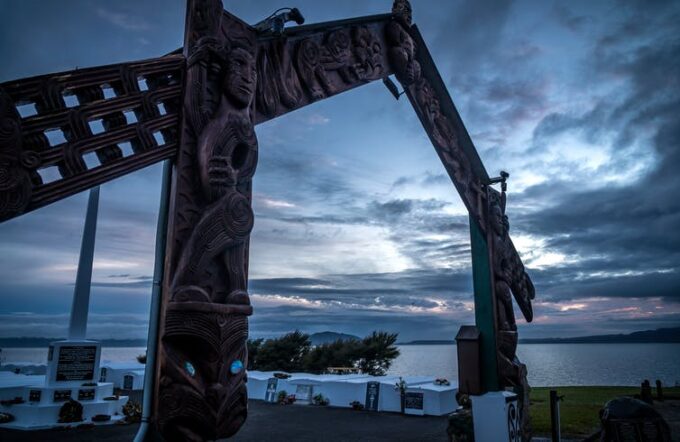
www.shutterstock.com
<h2><span data-contrast="auto">In early April the Education Review Office (ERO) released a report on the progress of the Aotearoa New Zealand Histories curriculum, which became compulsory for years 1 – 10 in 2023. </span><span data-ccp-props="{";201341983";:0,";335559739";:160,";335559740";:279}"> </span></h2>
<p><span data-contrast="auto">The report focused on four key inquiries: what is being taught, what is the impact on students, what is the impact for teachers and what is the impact on parents and whānau. </span><span data-ccp-props="{";201341983";:0,";335559739";:160,";335559740";:279}"> </span></p>
<p><a href="https://www.schoolnews.co.nz/latest-print-issue/" target="_blank" rel="noopener"><strong>Read the latest print edition of <em>School News</em> HERE</strong></a> </p>
<p><span data-contrast="auto">It found that although students are enjoying and engaged with ANZ Histories, teachers have been focused on local Māori history to the detriment of national and global events. The report recommends additional guidance for teachers including a more explicit curriculum and “off-the-shelf&#8221; content and exemplars. </span><span data-ccp-props="{";201341983";:0,";335559739";:160,";335559740";:279}"> </span></p>
<p><span data-contrast="auto">The expectation of engagement with local iwi and hapū was also found to be unrealistic for some schools. Around half have no or otherwise limited engagement with local hapū and iwi due to capacity constraints. </span><span data-ccp-props="{";201341983";:0,";335559739";:160,";335559740";:279}"> </span></p>
<p><span data-contrast="auto">Assessing student progress is also a challenge, and schools reported being in differing stages of implementation: not all schools are teaching the curriculum at all levels. </span><span data-ccp-props="{";201341983";:0,";335559739";:160,";335559740";:279}"> </span></p>
<figure id="attachment_28921" aria-describedby="caption-attachment-28921" style="width: 300px" class="wp-caption alignnone"><img class="size-medium wp-image-28921" src="https://www.schoolnews.co.nz/wp-content/uploads/2023/11/AdobeStock_296193909-1-300x200.jpeg" alt="" width="300" height="200" /><figcaption id="caption-attachment-28921" class="wp-caption-text">Teachers report being overwhelmed by curriculum design requirements. Photo: AdobeStock by Dmitriy</figcaption></figure>
<p><span data-contrast="auto">Teachers reported enjoying the curriculum change and seeing high levels of student engagement. However, they also report feeling overwhelmed at the scale of change required and the time needed to develop local curriculum. </span><span data-ccp-props="{";201341983";:0,";335559739";:160,";335559740";:279}"> </span></p>
<p><span data-contrast="auto">Parents and whānau say they were largely unaware of changes to the curriculum and little consultation was undertaken. Although they are largely supportive of ANZ histories, they say more global context is needed and sensitivity is required. </span><span data-ccp-props="{";201341983";:0,";335559739";:160,";335559740";:279}"> </span></p>
<p><span data-contrast="auto">Māori and Pacific students report higher engagement and enjoyment with ANZ Histories, however students of all ethnicities found the content strengthened a “New Zealand” identity. Learning and engagement was heightened when students saw themselves reflected in the content. ERO recommended explicit guidance for teachers to enable a better connection from local context to national and global events. </span><span data-ccp-props="{";201341983";:0,";335559739";:160,";335559740";:279}"> </span></p>
<blockquote>
<p><span data-contrast="auto">“It is important that histories are linked to global contexts and ERO found that students are more than twice as likely to enjoy ANZ Histories when they are learning about New Zealand’s place in the world,” said Ruth Shinoda, head of ERO’s Education Evaluation Centre. </span><span data-ccp-props="{";201341983";:0,";335559739";:160,";335559740";:279}"> </span></p>
</blockquote>
<p><span data-contrast="auto">The ERO also found that schools are currently overtly focused on new content and neglecting teaching key skills such as critical thinking. </span><span data-ccp-props="{";201341983";:0,";335559739";:160,";335559740";:279}"> </span></p>
<p><span data-contrast="auto">Speaking to RNZ, Education Minister Erica Stanford said that the report on ANZ Histories points to wider issues in the curriculum. </span><span data-ccp-props="{";201341983";:0,";335559739";:160,";335559740";:279}"> </span></p>
<p><span data-contrast="auto">“We have a very high level, vague, inconsistent curriculum that lacks specificity, lacks detail, and is not all in the same place. This puts a lot of work on teachers to develop their own local curricula&#8230; it leaves learning to chance,” said Stanford. </span><span data-ccp-props="{";201341983";:0,";335559739";:160,";335559740";:279}"> </span></p>
<figure id="attachment_27892" aria-describedby="caption-attachment-27892" style="width: 300px" class="wp-caption alignnone"><img class="size-medium wp-image-27892" src="https://www.schoolnews.co.nz/wp-content/uploads/2023/10/AdobeStock_197508581-300x200.jpeg" alt="" width="300" height="200" /><figcaption id="caption-attachment-27892" class="wp-caption-text">Erica Stanford says more explicit guidance in the curriculum is needed. AdobeStock by terovesalainen</figcaption></figure>
<p><span data-contrast="auto">Stanford said that explicit guidance from the curriculum was needed, which would free-up teachers from needing to learn curriculum design and ensuring they were able to do the job of teaching, such as “adding the magic, the excitement, tailoring the lessons to the kids in front of them.” </span><span data-ccp-props="{";201341983";:0,";335559739";:160,";335559740";:279}"> </span></p>
<p><span data-contrast="auto">Chris Abercrombie, President of PPTA Te Wehengarua said the ANZ Histories curriculum was a “huge improvement” on previous teaching. However, he said there is a clear need for more support for teachers to ensure “the curriculum content is covered in full.</span><span data-ccp-props="{";201341983";:0,";335559739";:160,";335559740";:279}"> </span></p>
<blockquote>
<p><span data-contrast="auto">“These are momentous changes and they will take time to tweak and improve.” </span><span data-ccp-props="{";201341983";:0,";335559739";:160,";335559740";:279}"> </span></p>
</blockquote>

Professional learning and development (PLD) for teachers needs to be higher impact for teachers and…
Students displayed increasing AI literacy when explicitly asked to engage with the technology for their…
A new Government collective offer will be voted on by members of NZEI Te Riu…
New Zealand’s education system is a canvas of opportunity to inspire and empower every child.…
When done well, a wellbeing challenge can build habits that support wellbeing for life—and lays…
Te Akatea Inc., the National Māori Principals’ Association has released a discussion paper reflecting on…
This website uses cookies.